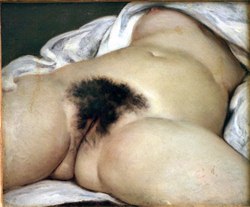I’m really not sure why this site exists, though I can certainly see escorts using it. Maybe it’s just for people in deep, deep denial?
yes i am!
This was my favorite song from the show when I saw it in Paris in 2004. Maybe it’s the beautiful Roxy Tornado, her energy and personality; or it’s just the song itself. I imagine this song has special relevance for some of the boys and girls in the audience.
Roxy is the performer I saw, though the set and her costume were a little different. Her body reminds me of mine when I was stripping, though I was never so on-beat or flexible. That special stripper-posture I talk about? This is it.
ps: the invisible majority
A few afterthoughts and reactions to my post.
I don’t have a problem with the awareness and understanding of privilege. Being aware of one’s advantages (luck, earned, given) is what’s known as “counting your blessings” where I grew up. It’s something every person should do at regular intervals. Counting one’s blessings is a private moment of personal reflection and it’s not necessary to be beaten over the head and/or ostracized if others don’t think you’re doing it right. There are ways of educating others about the concept of privilege and pointing out ways in which one may have an advantage. Then it’s time to move onto something else of greater importance: like changing laws that affect everyone regardless of any supposed privilege.
I apparently confused some [white] people by using the words “KKK” and “prejudice.” The KKK itself (or those who follow its value-system) hates quite a lot of people for a wide variety of reasons. It’s not all about skin color, folks. Prejudice and racism are different words, which is why I used “prejudice.” There is some overlap in concept (racism being a form of prejudice) but they do not actually mean the exact same thing. I wrote this post as clearly and simply as I could and it still confused people with too much schooling. Sigh. One activist who should know me better reacted as though I was a pet who pooped on the rug. No I’m not, and no I did not.
The UK seems to have some similar issues as the US. If you would like to take a look at thoughts from UK sex workers, please go over and enjoy the musings of Elrond and Douglas Fox — who made the most brilliant statement on the whole issue: “Activism groups have to understand that sex workers have many voices and many political allegiances and many experiences. Our diversity is our strength but instead it is being made our weakness.”
Furry Girl was inspired to bring the issue to a head. She is absolutely right in that it’s a (literal) working class issue. She boiled it down to 4 important points. I look forward to the start of her new project. Changing minds is changing minds. It needs to be done. Period.
a natural history of the prostitute

Prostitutes are born.
Not every sex worker in the world enters the work because she has always felt a pull towards it. Many have. I know a number of women who have felt the interest from a young age, including myself (and this was before I even had a clear idea of what sex was). Conversations with these women reveal that we all say the same things about our early interest, we all became interested right before entering puberty and common myths about prostitution were not enough to dissuade us from desiring that life-path.
This is a very small sampling and it’s highly unscientific. Given what we know about genes and hard-wired behaviors — it seems more than plausible. Just as homosexual people are born, I am convinced prostitutes are born too.
My inspiration came last year after reading a US-based survey about attitudes toward gay people. The discovery of “gay genes” seems to have really turned the tide in popular thinking and acceptance of homosexuality. It sounds like an argument of convenience for prostitution. But if the range of human sexual orientation is, in fact, genetic; then how come prostitution — an extremely common sexual behavior — supposedly isn’t? What if prostitution isn’t merely a sexual behavior but is actually a sexual orientation? Why has prostitution always been viewed as a deviant behavior? How come people aren’t willing to examine the idea that a prostitute is a perfectly natural occurrence and that it’s society which has formed the deviant behavior around the prostitute?
If being a prostitute is a natural tendency for a percentage of women, then how can laws be made against who they are?
aerials
Continuing my 2011 smackdown, please welcome Mistress Matisse and Susie Bright. There is a delicate balance when one achieves mainstream prominence as a sex worker/former sex worker. It’s important to remember you’re assumed to speak for sex workers, and young sex workers look up to you. It helps not to throw sex workers without a column under the bus.
Read more